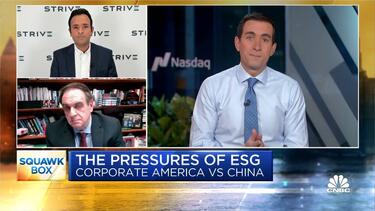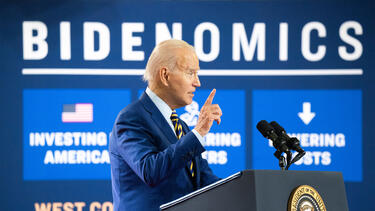Jeffrey A. Sonnenfeld
How Peace and Prosperity in the Middle East Can Still Be Reached
Paradoxically, the invasion of Israel could could help accelerate progress toward regional peace, write Yale SOM’s Jeffrey Sonnenfeld, diplomat Dennis Ross, and investor Adam Boehler, former CEO of the U.S. International Development Finance Corporation.

The Russian Oil Price Cap Can Work Again
With oil prices rising, Russia is finding ways around the price cap set earlier this year. But Yale SOM’s Jeffrey Sonnenfeld, who advised on its implementation, writes that with rapid adjustments, the program can continue to hobble Vladimir Putin’s war effort.

The Budget Deal Is a Tragedy for Ukraine
With hours to go before a government shutdown, Congress passed a short-term spending bill—but the deal came at the cost of aid for Ukraine. Yale SOM’s Jeffrey Sonnenfeld writes that even if a separate funding bill eventually passes, the move weakens the coalition against Russia.

What Awaits Ukraine Once the War Ends? Prosperity, For One Thing
Once freed from Russian aggression, Ukraine will thrive, argues Prof. Jeffrey Sonnenfeld.

What I Learned Debating Vivek Ramaswamy
Yale SOM’s Jeffrey Sonnenfeld, who has tangled on cable news with the entrepreneur turned GOP candidate, says the key is to avoid following him down diversionary rabbit holes.

Horatio Alger Is a Hoax, But We Can Still Celebrate the American Dream
Horatio Alger, the 19th-century writer whose name became shorthand for self-improvement, is in the news because of Justice Clarence Thomas’s connection to the Horatio Alger Association of Distinguished Americans. But Yale SOM’s Jeffrey Sonnenfeld says that Alger’s story says more about mythmaking than it does about the American dream.

The Critics of Bidenomics Are Being Proven Wrong
Yale SOM’s Jeffrey Sonnenfeld and Steven Tian write that much of the credit for the economic good news belongs to President Joe Biden and his transformative public investment programs.

How Putin Cannibalizes the Russian Economy to Fund His War
Yale SOM’s Jeffrey Sonnenfeld and Steven Tian write that the Russian leader is fueling battles in Ukraine by shaking down his own people and leveraging his country’s future.

Meet the Five Schools of Thought Dominating the Conversation about AI
Yale SOM’s Jeffrey Sonnenfeld and Steven Tian and economists Paul Romer and Dirk Bergemann explain the arguments from each camp in the debate over artificial intelligence, from true believers to alarmists.

We Put Aside the Hype and Asked CEOs What They’re Actually Planning for AI
The headlines are full of grand and sometimes terrifying speculation about the potential of artificial intelligence. At Yale SOM’s CEO Summit recently, Prof. Jeffrey Sonnenfeld asked business leaders for some real talk about how their companies are using the technology.
